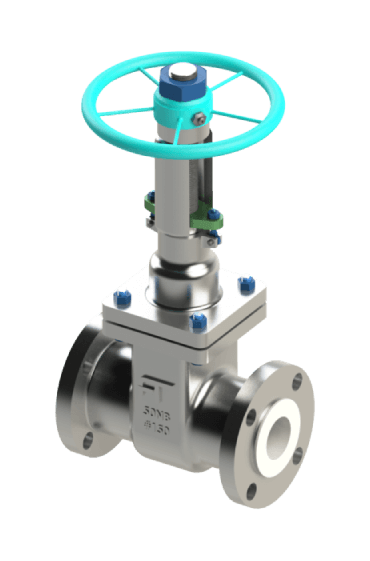In industrial settings, the handling of corrosive fluids poses significant challenges to equipment longevity and safety. Corrosive substances can rapidly deteriorate unprotected metal components, leading to leaks, equipment failure, and potential safety hazards. Lined gate valves are a vital solution in such environments, providing an effective barrier against corrosion and ensuring reliable performance. This article delves into the role of lined gate valves in corrosive environments, the types of industries where they are most beneficial, and the factors that make them indispensable for safe and efficient operations.
Why Are Lined Gate Valves Important in Corrosive Environments?
Corrosion Resistance: The primary advantage of lined gate valves is their resistance to corrosion. In applications where acids, alkalis, or other aggressive chemicals are handled, lined valves offer a protective lining made of materials like PTFE, PFA, or rubber. This lining acts as a shield, preventing the valve's metal body from coming into direct contact with the fluid, thereby reducing the risk of corrosion.
 |
| PFA Lined Gate Valve |
Enhanced Safety: When handling corrosive chemicals, any leak or valve failure can pose serious safety risks, including exposure to hazardous substances and environmental contamination. Lined gate valves provide a reliable seal, reducing the likelihood of leaks and ensuring that corrosive substances remain contained within the pipeline.
Extended Equipment Lifespan: Corrosion can cause rapid wear and tear on unprotected metal components, leading to frequent repairs or replacements. By using lined gate valves, industries can significantly extend the lifespan of their equipment, as the lining protects the internal components from corrosive damage.
Cost Savings: While lined gate valves may have a higher initial cost compared to unlined valves, the long-term savings in maintenance, downtime, and equipment replacement make them a cost-effective choice. The reduced need for frequent valve replacements and maintenance minimizes operational costs over time.
Industries That Benefit from Lined Gate Valves
Chemical Processing: In the chemical industry, lined gate valves are extensively used to handle highly corrosive substances such as acids, alkalis, and solvents. The wide range of chemical compatibility offered by different lining materials allows for safe handling of various chemicals without compromising valve performance.
Pharmaceutical Manufacturing: The pharmaceutical industry often requires high-purity systems that prevent contamination from metallic components. Lined gate valves ensure that the fluids do not come into contact with the metal parts of the valve, making them suitable for processes involving aggressive cleaning agents and chemical synthesis.
Water and Wastewater Treatment: Water treatment facilities use lined gate valves to manage chemicals such as chlorine, acids, and other disinfectants that are used in the purification process. In wastewater treatment, the valves help handle aggressive chemicals and prevent scaling or corrosion from the buildup of solid materials.
Pulp and Paper Industry: The pulp and paper industry utilizes lined gate valves in processes involving bleaching chemicals, acids, and other corrosive substances. The lining helps protect the valve from damage caused by these chemicals, ensuring continuous operation in a demanding environment.
Mining and Minerals Processing: In mining, lined gate valves are used for handling slurries containing abrasive and corrosive materials. The lining prevents the valve body from eroding, which would otherwise compromise the valve's integrity and increase the risk of equipment failure.
Factors to Consider When Using Lined Gate Valves in Corrosive Environments
Compatibility of Lining Material: Not all lining materials are suitable for every corrosive substance. It is crucial to select a lining material that is compatible with the specific chemicals being handled. For example, PTFE is suitable for a wide range of chemicals, while PFA may be preferred for handling aggressive acids at higher temperatures.
Operating Temperature and Pressure: Lining materials have specific temperature and pressure limits. It is essential to ensure that the selected material can withstand the operating conditions of the process. For example, PTFE can handle temperatures up to 260°C, whereas rubber linings may be suitable for lower temperature ranges.
Abrasion Resistance: In environments where abrasive materials are present, the lining must be able to withstand wear and tear. Rubber-lined valves or valves with hard coatings may be more suitable for slurry handling applications.
Valve Size and Design: The design of the lined gate valve should be appropriate for the specific application. Some processes may require custom configurations or additional features such as actuators for automated operation.
Conclusion
Lined gate valves play a crucial role in managing corrosive environments by providing a robust barrier against chemical damage, enhancing safety, and extending the lifespan of equipment. Their wide range of applications across industries such as chemical processing, pharmaceuticals, water treatment, and mining demonstrates their versatility and effectiveness in handling aggressive substances. When selecting lined gate valves, it is essential to consider factors such as chemical compatibility, temperature and pressure requirements, and abrasion resistance to ensure optimal performance.
No comments:
Post a Comment